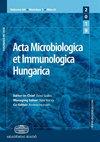Molecular characteristics of carbapenem-resistant Raoultella ornithinolytica
IF 1.6
4区 医学
Q4 IMMUNOLOGY
引用次数: 0
Abstract
Abstract Aim of this study was to explore molecular characteristics and resistance mechanisms of carbapenem-resistant Raoultella ornithinolytica (CR-ROR) isolated from patients in a hospital in China. Three CR-ROR strains were collected and bacterial identification was done by Matrix-Assisted Laser Desorption/Ionization Time of Flight Mass Spectrometry (MALDI-TOF-MS) Vitek-MS and by digital DDH analysis. VITEK 2 compact system and Kirby-Bauer (K–B) disk diffusion were used for antimicrobial susceptibility testing. Whole genome sequencing was carried out using the Illumina platform NovaSeq sequencer. Abricate software was used for the prediction of antibiotic resistance genes of three CR-ROR strains. The phylogenetic tree was constructed through genome SNPs to investigate the genetic relationship of three CR-ROR strains. Three CR-ROR (WF1357, WF2441, and WF3367) strains were collected in this study. Two strains were isolated from neurosurgery (WF1357 and WF2441), and one was isolated from pulmonology department (WF3367). All strains harboured multiple antibiotic resistance genes. Two strains (WF1357, WF2441) carried the bla NDM-1 gene, one of the strains (WF3367) carried the bla KPC-2 gene. Three CR-RORs were resistant to different antimicrobial agents including carbapenems. The three CR-ROR strains collected in this study and 51 CR-ROR strain genomes downloaded from NCBI, were divided into six evolutionary groups (A-F). In this study, three CR-ROR strains were found to have a higher level of resistance to antibacterial agents and carried multiple antibiotic resistance genes. The CR-ROR strains carrying multiple antibacterial resistant genes require the stringent monitoring to avoid the spread of multidrug-resistant bacterial strains.耐碳青霉烯型溶鸟劳氏菌的分子特征
摘要本研究旨在探讨中国某医院患者分离的耐碳青霉烯型溶鸟劳氏菌(CR-ROR)的分子特征及耐药机制。收集3株CR-ROR菌株,采用基质辅助激光解吸/电离飞行时间质谱(MALDI-TOF-MS)、Vitek-MS和数字DDH分析进行细菌鉴定。采用VITEK 2紧凑型系统和Kirby-Bauer (K-B)纸片扩散法进行药敏试验。全基因组测序采用Illumina平台NovaSeq测序仪。采用Abricate软件对3株CR-ROR菌株的耐药基因进行预测。通过基因组snp构建系统发育树,探讨3株CR-ROR菌株的亲缘关系。本研究共收集到3株CR-ROR (WF1357、WF2441和WF3367)菌株。2株分离自神经外科(WF1357和WF2441), 1株分离自肺科(WF3367)。所有菌株都含有多种抗生素耐药基因。2株菌株WF1357、WF2441携带bla NDM-1基因,1株菌株WF3367携带bla KPC-2基因。3种CR-RORs对碳青霉烯类等不同抗菌素具有耐药性。将本研究收集的3株CR-ROR菌株和从NCBI下载的51株CR-ROR菌株基因组分为6个进化类群(A-F)。本研究发现3株CR-ROR菌株对抗菌药物具有较高的耐药水平,并携带多种耐药基因。携带多重耐药基因的CR-ROR菌株需要严格监测,以避免多重耐药菌株的传播。
本文章由计算机程序翻译,如有差异,请以英文原文为准。
求助全文
约1分钟内获得全文
求助全文
来源期刊

Acta microbiologica et immunologica Hungarica
IMMUNOLOGY-MICROBIOLOGY
CiteScore
2.30
自引率
13.30%
发文量
36
审稿时长
>12 weeks
期刊介绍:
AMIH is devoted to the publication of research in all fields of medical microbiology (bacteriology, virology, parasitology, mycology); immunology of infectious diseases and study of the microbiome related to human diseases.
 求助内容:
求助内容: 应助结果提醒方式:
应助结果提醒方式:


